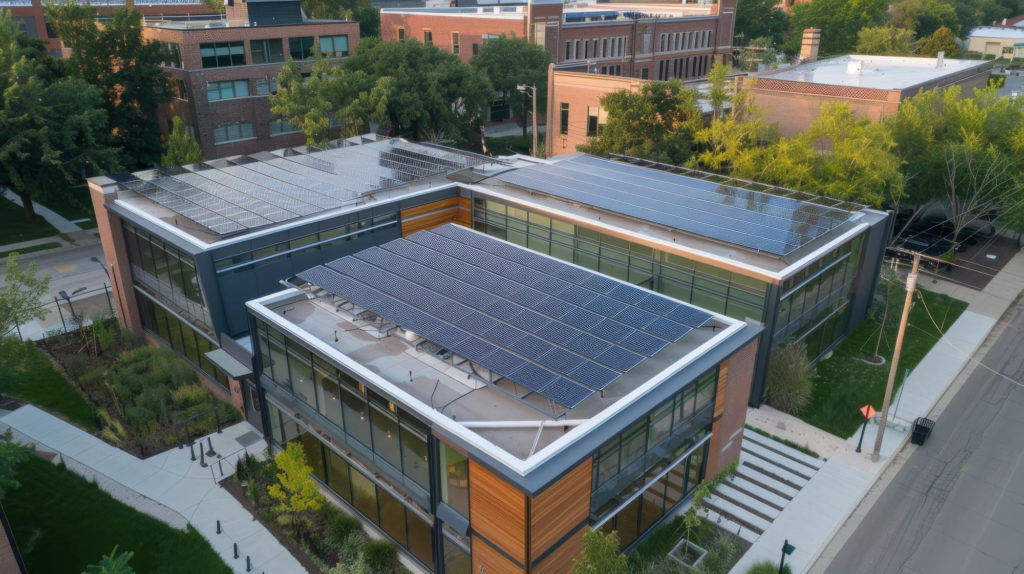As energy prices remain high and the UK closes in on its 2050 net-zero target, more businesses are looking to take control of their energy. Commercial solar panels offer a powerful solution. Not only can they reduce your carbon footprint, but they can also protect your bottom line and position your brand as a sustainability leader.
But where do you begin?
This guide is designed to explain everything you need to know about commercial solar, from the financial and regulatory benefits to what installation might look like on your site. Whether you’re gathering information for a future project or ready to make a change, this is your go-to resource for getting started with solar in the commercial sector.
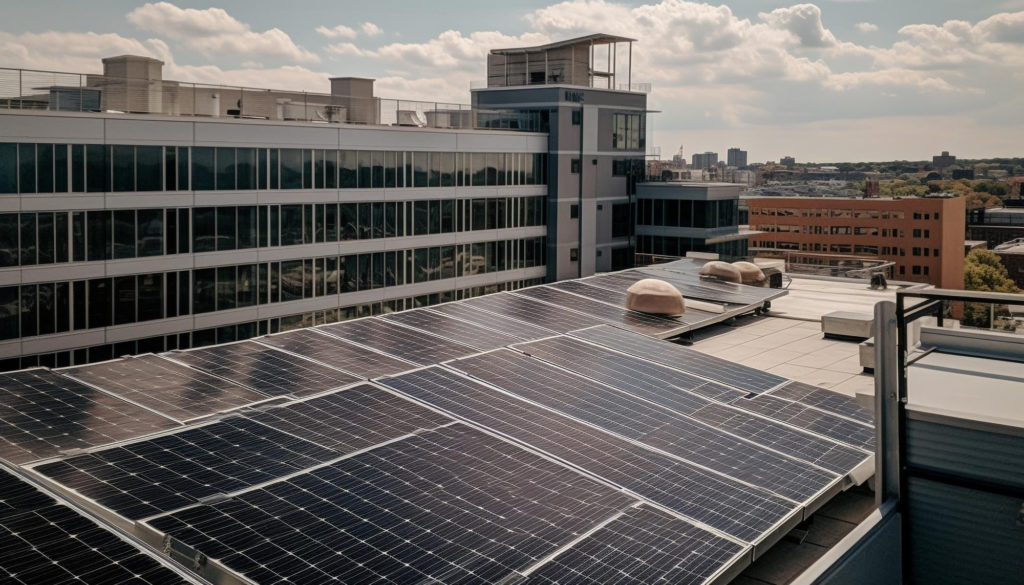
What Are Commercial Solar Panels?
Commercial solar panels are designed to convert sunlight into electricity for use in non-residential buildings. Installed on rooftops or ground-mounted systems, these panels offer businesses a way to reduce their reliance on grid electricity, lower operating costs, and support sustainability goals.
Unlike residential systems, commercial solar panels are built to accommodate larger energy demands with higher-capacity panels and advanced inverter systems. The advantage of commercial systems is that they can be scaled and configured to suit different facility layouts and business energy requirements.
One significant advantage of commercial solar systems is their adaptability. Whether you run a high-consumption facility or a small public sector office, solar panel systems can be tailored to meet your specific building and operational needs.
In terms of scale, most commercial systems range from 20kW to several hundred kilowatts, depending on the building size and energy usage. These systems typically consist of photovoltaic (PV) panels paired with inverters and optional battery storage to maximise self-consumption and savings.
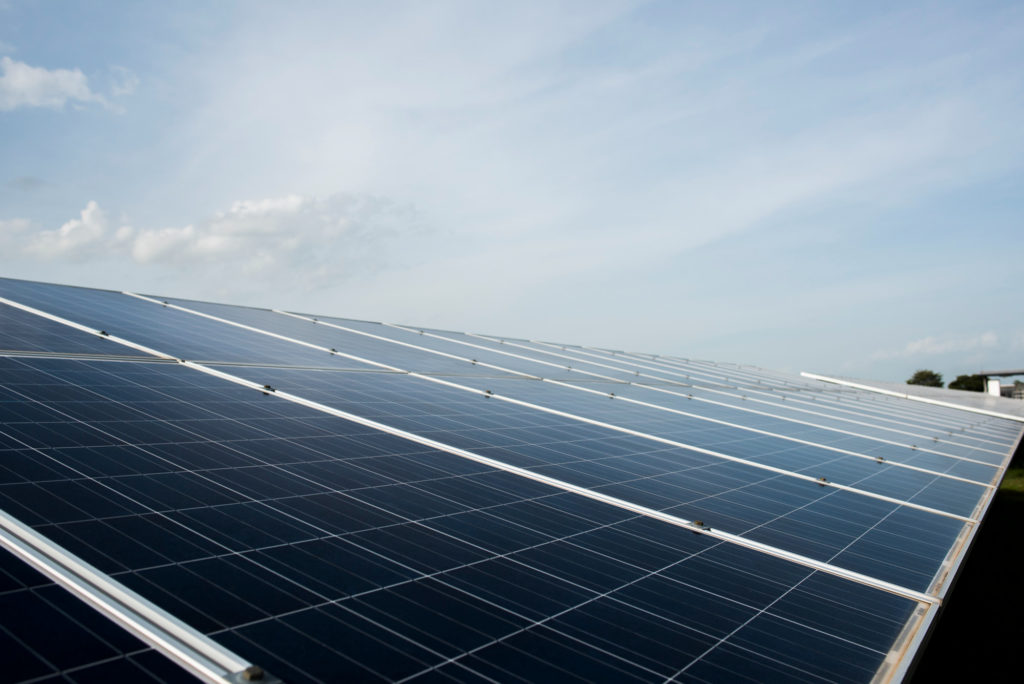
Why Should Commercial Buildings Install Solar Panels?
As pressure mounts from both environmental policy and economic volatility, more UK businesses are turning to commercial solar panels as a way to secure their future. Whatever your requirements, installing a commercial solar system offers a wide range of benefits, including:
Environmental
The UK government has committed to reaching net-zero carbon emissions by 2050, emphasising renewable energy’s role in commercial and public-sector operations. For many organisations, reducing carbon output is no longer just about ticking a box – it’s about leading with purpose.
Commercial solar panels play an important role in achieving net zero targets and empower businesses to take control of their environmental impact. Companies can generate their own clean energy on-site instead of relying solely on green tariffs or renewable electricity providers.
But it’s not just about policy. Many companies invest in solar to align with corporate social responsibility initiatives and meet Environmental, Social and Governance (ESG) goals. These eco-commitments resonate with customers, investors, and employees, strengthening brand reputation and stakeholder confidence.
Economic
Commercial solar panels offer compelling financial value:
- Long-Term Cost Savings: By generating your own clean energy, solar panels can cut your monthly electricity bills dramatically. With supplier rates hovering around 25p per kWh, switching to solar means real, long-term savings.
- Energy Price Protection: In early 2025, UK energy prices remained significantly above pre-crisis levels. Solar provides some independence from this volatility.
- Incentives & Support: Businesses can benefit from several UK-specific schemes, including:
- The Smart Export Guarantee (SEG), which pays for surplus electricity exported back to the grid
- Enhanced Capital Allowances for energy-efficient equipment
- Various grants and low-interest financing are available through government and regional programs
For many businesses, the return on investment becomes apparent within just a few years – especially as energy prices continue to rise.
Compliance
If your organisation is subject to mandatory carbon reporting, solar energy can help reduce its emissions profile.
- Streamlined Energy and Carbon Reporting (SECR): Applicable to large UK companies, solar installations help reduce scope 2 emissions from purchased electricity.
- Energy Savings Opportunity Scheme (ESOS): Businesses identified under this scheme can use solar as a strategic energy-saving measure.
- Public sector and local authorities may also work within sustainability frameworks or decarbonisation funding programs, like PSDS, where solar plays a pivotal role.
By investing in commercial solar panels in the UK, businesses meet their legal obligations and gain a competitive edge in an increasingly sustainability-driven marketplace.
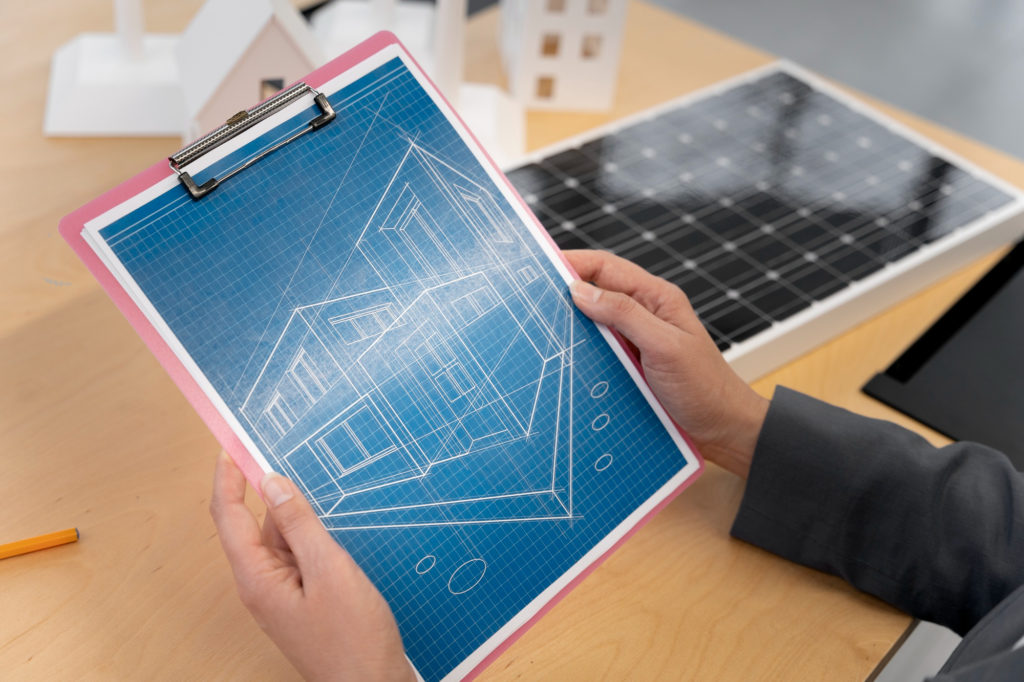
How to Get Started with Commercial Solar Panel Installation
Installing solar panels for a commercial building is a strategic investment. Below, we’ve broken down the key steps and considerations to help you get started.
Site Suitability
The first step is determining whether your site is viable for a commercial solar panel installation. Several technical and legal factors will influence this and be flagged during a site survey:
- Ownership: Do you own the building or have a long-term lease with permission to make modifications? If you’re leasing, landlord approval is essential.
- Planning Permission: Some commercial sites may require planning permission, especially in conservation areas or listed buildings.
- Roof Condition: Solar panels require a structurally sound roof. If your roof is nearing the end of its lifespan, it’s worth considering refurbishing it alongside installation.
- Roof Orientation: In the UK, south-facing roofs are ideal because they receive the most sunlight throughout the day. In comparison, east and west-facing roofs average a 15–20% efficiency drop.
- Roof Angle: Solar panels perform best between 35° and 40° but can be installed on most pitched or flat roofs. If your roof is outside this range, adding a few extra panels can compensate for any reduction in efficiency.
- Shading: Buildings or trees that cast shade can limit output.
- Space for Supporting Equipment: If you want to maximise your energy independence, you’ll also need a location to install an inverter and possibly battery storage.
If you’re wondering how effective solar is in the UK climate, check out our blogs on solar panel performance in winter and the impact of rain on solar panels – you might be surprised by how well modern systems work in colder, cloudier conditions.
Funding Options
Cost is one of the most significant considerations when installing solar panels.
While the upfront investment varies depending on the size of your system, energy consumption, and whether you include battery storage, there are multiple ways to manage your budget:
- Capital Investment: Direct purchase with the highest long-term return.
- Leasing or Power Purchase Agreements (PPAs): A third party installs and owns the system, and you buy the energy at a reduced rate.
- Government Incentives: Including the Smart Export Guarantee (SEG), which allows you to earn money by exporting unused electricity back to the grid.
Our team can provide a full breakdown of funding options and return on investment specific to your site.
Choosing an Installer
You’ll want to work with an installer who has the proper technical knowledge, is certified, and is experienced in commercial-scale systems.
At GW Power, we’re proud to be one of the UK’s leading commercial solar installers.
Our systems deliver maximum efficiency, durability, and savings. We handle everything from feasibility studies to installation and grid connection – so you can focus on running your business. And after your system is installed, you’re not on your own. We provide full solar panel servicing and maintenance to help you get the most out of your investment.
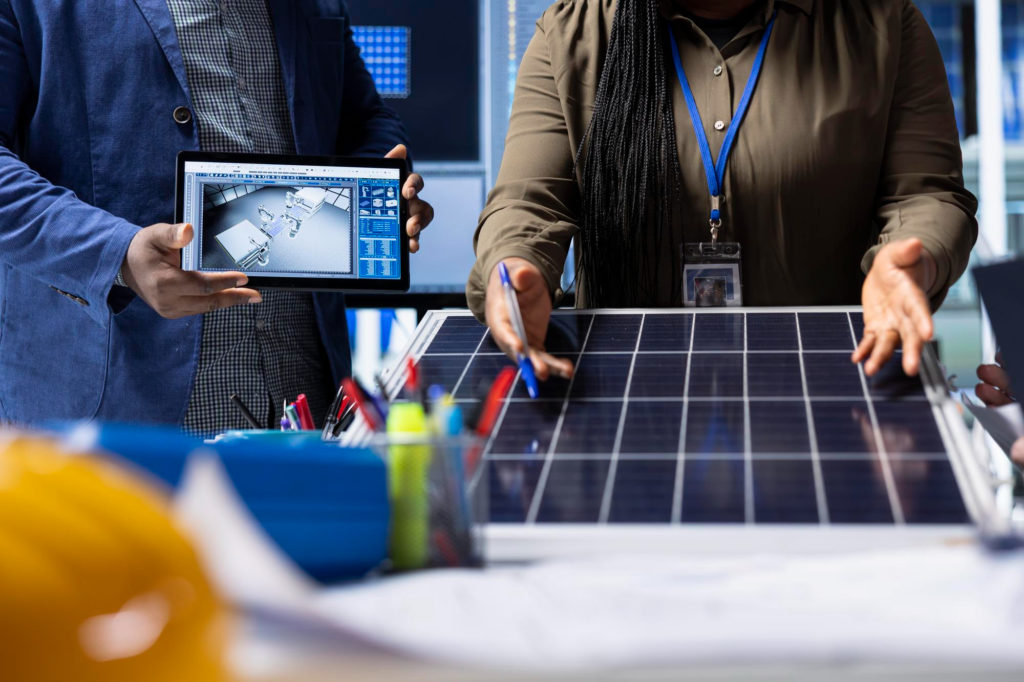
How Solar Can Transform Your Commercial Building
Investing in solar panels for commercial buildings isn’t just about saving money; it’s about your organisation’s future. From long-term cost reduction to strengthening your sustainability credentials, solar energy can become a strategic asset for your business.
With the right system in place, you can:
- Cut monthly energy costs and reduce reliance on the grid
- Protect your business from energy price volatility
- Improve your carbon footprint and support net-zero goals
- Build stakeholder trust and enhance your brand’s environmental credentials
At GW Power, we plan, install, and maintain commercial solar systems that deliver long-term value. Whether you’re exploring initial feasibility or ready to install, our team is here to help guide you every step of the way.
Still wondering what solar could look like in practice? See how we helped Hornsea Leisure Centre reduce its carbon emissions and energy costs with a customised rooftop solar installation. Or explore our project with Humber Calibration, where a flat roof solar system now plays a key role in their wider sustainability strategy.Contact GW Power today to arrange a consultation or site survey and discover how a commercial solar installation can power your next growth phase.

